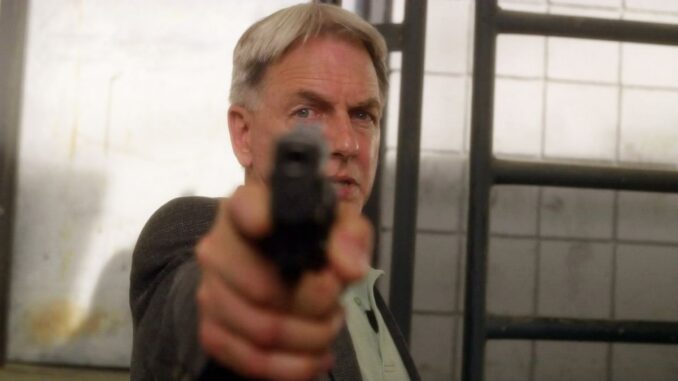
Face Off Ends in Deception: Who Did Gibbs Really Shoot?
The world of NCIS is often a moral quagmire, a labyrinth of secrets and shadows where the line between good and evil blurs with terrifying frequency. Few episodes encapsulate this more potently than "Face Off," the pivotal moment where Special Agent Leroy Jethro Gibbs finally confronts his nemesis, Ari Haswari, the rogue Mossad agent who brutally murdered Kate Todd. The climax of this harrowing confrontation, however, is not a clean, vengeful shot fired by Gibbs, but a twist of fate that leaves a lingering question: if Ziva David truly pulled the trigger, then what, or who, did Gibbs himself truly shoot in that deceptive, world-altering moment?
On the surface, the answer to "who shot Ari" is unequivocally Ziva David. In a heart-stopping sequence, Ari has Gibbs cornered, gun to his head, moments from fulfilling his twisted vendetta. Just as all hope seems lost, Ziva, the mysterious Mossad liaison newly assigned to NCIS, appears from the shadows and delivers a swift, fatal bullet to Ari's forehead. It’s a moment of immense relief, an apparent act of heroism that saves Gibbs’s life and seemingly brings closure to the trauma of Kate’s death. Ziva is hailed as a savior, a new, formidable ally in the fight against terrorism. This immediate perception is the first layer of deception – a carefully constructed facade of pure, uncomplicated heroism.
The true, deeper deception unravels over subsequent seasons, revealing a chilling complexity that fundamentally alters the nature of that "face-off." Ari Haswari was not merely a rogue agent; he was Ziva’s half-brother, the son of her powerful, manipulative father, Eli David, the Director of Mossad. This revelation transmutes Ziva's "heroic" act from a simple act of self-defense or loyalty to Gibbs into a deeply conflicted familial duty, a cold, calculated execution, or perhaps even an elaborate cover-up orchestrated by Mossad to erase a stain on their record. Ziva's act becomes less about saving Gibbs and more about managing a profound family and organizational crisis. The initial relief Gibbs felt is retroactively tainted by the knowledge that his savior was also Ari's kin, a fact she deliberately concealed. The "face-off" ended not just in a death, but in a profound act of omission and manipulation that set the stage for years of mistrust and complicated alliances.
Given this understanding, the question "who did Gibbs really shoot?" transcends the literal and delves into the metaphorical. If Ziva pulled the trigger on Ari, Gibbs, in that decisive moment, “shot” something far more profound within his own world and psyche:
Firstly, Gibbs shot the possibility of clean, unadulterated vengeance. For months, Ari had been Gibbs's white whale, the target of his grief and fury. Gibbs wanted to be the one to end Ari, to avenge Kate personally. Ziva's intervention, while saving his life, robbed him of that visceral, singular act of retribution. She took the kill, denying him the closure he craved on his own terms. In a strange way, Ziva's bullet shot away Gibbs's chance at ultimate satisfaction, forcing him to live with a shared, complicated "victory" rather than his own singular triumph.
Secondly, Gibbs shot his unshakeable belief in straightforward justice and the simplicity of good versus evil. Prior to Ari's death, Gibbs operated largely in a world of clear-cut lines: criminals were caught, justice was served. Ziva's revelation shatters this simplicity. It introduces the murky, morally ambiguous world of international espionage, where family ties supersede national loyalties, where "allies" withhold vital information, and where personal vendettas intertwine with geopolitical machinations. Gibbs's understanding of the world became exponentially more complex, layered with the shadows of Mossad's clandestine operations and Ziva’s convoluted loyalties. He "shot" his own naive view of how the world truly worked.
Thirdly, and perhaps most painfully, Gibbs shot the nascent, fragile seeds of unconditional trust. Ziva became an integral part of his team, almost a surrogate daughter figure. Yet, her foundation with NCIS was built on a lie of omission – her silence about Ari being her brother. This fundamental deception corroded the bedrock of their future relationship, forcing Gibbs to forever second-guess her motives, to see every one of her actions through the lens of potential Mossad directives or familial allegiances. He "shot" the possibility of an uncomplicated, absolute trust in her, forcing him to build their bond on a foundation perpetually riddled with hidden crevices.
The "Face Off" episode, therefore, stands as a masterclass in narrative deception and psychological impact. While Ziva David's bullet ended Ari Haswari's life, it was Gibbs who, in the profound aftermath of that shot and the subsequent revelations, "shot" the clean slate of his own vengeance, the simplicity of his moral compass, and the unblemished trust he might otherwise have placed in a new teammate. The episode is not just about the death of a villain; it is about the birth of a more complex, jaded Gibbs, forever marked by the deceptive truths unveiled in that critical, bloody confrontation. The echo of that shot reverberated for years, shaping the very soul of NCIS and the man who led it.